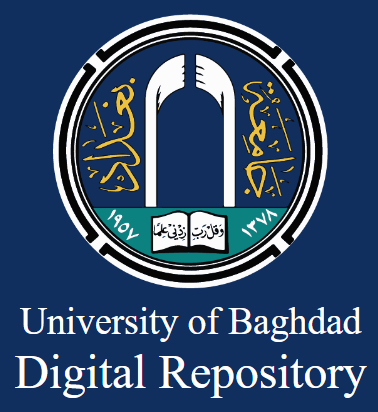دور السياق في التصميم الجرافيكي
DOI:
https://doi.org/10.35560/jcofarts107/113-128الكلمات المفتاحية:
السياق، التصميم الجرافيكيالملخص
تملي الحاجة الى الفهم الفكري للسياق من عدة جوانب الى فهم السبل التي يسير من خلالها المصمم الجرافيكي في محاكاة المبتغى من العملية التصميمية والارتقاء بها الى مستويات من الادراك الاتصالي الذي يؤدي الى ايصال الفكرة الى المتلقي، وهي بذلك حاجة ذات ارتباط وثيق بين السياق ان كان تاريخيا او ثقافيا او اجتماعيا وبين آليات اختيار واشتغال عناصر ووحدات المنجز التصميمي والجرافيكي ، وعلى هذا الاساس يمكن دراسة دور السياق في التصميم الجرافيكي .
تضمن البحث اربعة فصول تكون الفصل الاول من مشكلة البحث والحاجة اليه، وكان هدف البحث هو (الكشف عن دور السياق في التصميم الجرافيكي)، ومن ثم اهمية البحث، وحدد البحث بثلاثة حدود موضوعية وزمانية ومكانية، فضلاً عن تحديد مصطلحات البحث. أما الفصل الثاني فقد تضمن الاطار النظري، وقد تكون من مبحثين، الاول هو (مفهوم السياق وانواعه ) ، والمبحث الثاني (السياق في التصميم)، ومن ثم الفصل الثالث )إجراءات البحث(، إذ اعتمدت الباحثان المنهج الوصفي طريقة لتحليل المحتوى، استناداً لما تمخض عنه الاطار النظري من مؤشرات، ومن ثم تم اختيار عينة البحث بصورة قصدية، لنماذج من الشعارات العالمية . لتحقيق هدف البحث، ومن ثم خرج البحث بنتائج واستنتاجات، منها:
1- نتج عن اتباع السياق التاريخي في تصميم الشعارات انتماء للأفكار الموروثة لكل حقبة زمنية وتجسيدا لها ضمن تحولاتها الزمنية، وظهر ذلك في النموذجين.
2- ادى توظيف المعالجة بالاختزال وتحديدا في الانموذج الاول الى تحقيق سهولة في التلقي.
المراجع
- Abdel Qader Abdel Jalil, The Science of Modern Linguistics, Dar Al-Safaa Publishing House, Amman, 1st Edition, 2002.
-Al-Akabi, Dr. Jassim Abdul Wahed Rahi, Simplicity and Complexity Critical and Rhetorical Terms, Contemporary Islamic Studies, University of Karbala, 2014.
-Al-Obeidi, Ali Ahmed Muhammad, Contextual Patterns and Its Significance in the Popular Poem Performed in Mosul (Al-Zuhairi as a Model), Research Published in the Journal of Mosuliya Studies, University of Mosul, Issue 43, Mosul, Iraq, 2013.
- Faizan Bhatti. Graphic Design Styles. bhattifaizan.medium.com/graphic-design-styles .
- Fawzi Issa - Rania Fawzi Issa: Semantics Theory and Application, University Knowledge House, Alexandria, Arab Republic of Egypt, 1st Edition, 2008
- John Lines, Language, Meaning and Context, translated by Dr. Abbas Sadiq Al-Wahhab, reviewed by Dr. Lionel Aziz, House of Cultural Affairs, Ministry of Culture and Information, Baghdad, Iraq, 1987
-Kantor, K. M. Experience of a social and philosophical explanation of the design possibilities of design / K. M. Kantor // Vopr. Philosophy, (1982) .
-Mahmoud Imhaz, Contemporary Artistic Currents, Publications Company for Distribution and Publishing, Beirut, Lebanon, 1996 .
- Meggs, Philip, A history of graphic design, New York: John Wiley & Sons.1998.
- Raafat Asaad, Artist and Artwork in the Social Context, Educational Visions Magazine, Issue 60, A.M. Qattan Foundation, London, UK 2020 .
-Stefan Mouttet, https://news.mediaheroes.com.au/blog/graphic-design-styles
- Wajih Magdy, A Dictionary of Arab Terms, Beirut, Lebanon, 1980.
ELMAHI, Z. (2022). Art as a therapy to relieve symptoms of Attention Deficit/Hyperactivity Disorder (ADHD), in children. Al-Academy, (106), 167–186. https://doi.org/10.35560/jcofarts106/167-186
bint Mohammad AlMutairi, S., & bint Ayed Alharbi , R. (2022). Inventory of Saudi youth trends towards choosing fashion accessories. Al-Academy, (106), 205–230. https://doi.org/10.35560/jcofarts106/205-230
Saleh Moraished, L., & Saleh Al-Saleh, M. (2022). The Relationship Between Using Diverse Materials to the Intellectual Context’s in the Art of Contemporary Ceramic. Al-Academy, (106), 253–270. https://doi.org/10.35560/jcofarts106/253-270
mohammed Alamri, M., & bint Mansour Abdul Aziz aljadid, M. (2022). Printmaking Techniques to Enable People with Visual Impairment to Taste Print Artworks. Al-Academy, (106), 297–318. https://doi.org/10.35560/jcofarts106/297-318
Gharsan Alshehri, H. . (2022). Role Of the Interactive Public Sculpture in Increasing Physical Activity . Al-Academy, (105), 57–80. https://doi.org/10.35560/jcofarts105/57-80
Ibrahim Alhulwah, N. ., Saud Alrasheed, E. ., & Almokhtar Lahyani, S. . (2022). The semiotics of the visual image of women in the discourse of empowerment, Saudi Arabia Kingdom as a model. Al-Academy, (103), 25–42. https://doi.org/10.35560/jcofarts103/25-42
Ahmad allaoui, L. . (2022). Textual thresholds and its Aesthetic in history: "Mamo Zain" by its author, the famous Kurdish poet Sheikh Ahmad Al-Khani, deceased (1118 AH / 707 AD), translated by Sheikh Dr. Muhammad Saeed Ramadan al-Bouti. Research on the connotation and manifestations of interconnection. Al-Academy, (103), 73–92. https://doi.org/10.35560/jcofarts103/73-92
mohamed Dammak, K. (2022). Transformations of the body from traditional expression to subjectivity : Marina Abramivic as a model. Al-Academy, (103), 149–164. https://doi.org/10.35560/jcofarts103/149-164
shafee, wafa H., & aboabat, A. A. (2021). Recycling waste toys to accessories suggested uniform for educational units in kindergarten stages. Al-Academy, (102), 63–80. https://doi.org/10.35560/jcofarts102/63-80
Ebraheem Mongy, Y. ., Amer Al-Hajri, S. ., & Al Mardhoof Al Saadi, N. . (2021). Inspiring heritage and symbols of local identity in contemporary Omani Graphic Art. Al-Academy, (102), 81–104. https://doi.org/10.35560/jcofarts102/81-104
Nasser AL Nahari , N. . (2021). The Role of Contemporary Interactive Art Works Economically and Culturally "An Analytical Study". Al-Academy, (102), 123–144. https://doi.org/10.35560/jcofarts102/123-144
Kalied Talib Alsamurai, A. . (2021). The communicative education of fine arts in the COVID-19 crisis and its manifestations in the modernization of the works of the Iraqi painter "Nabil Ali as a model". Al-Academy, (102), 207–222. https://doi.org/10.35560/jcofarts102/207-222
Daryanavard (al-ghaisi), Z., Balavi, R., & M. Bataineh, A. (2021). The Communicative Functions in The Speech of The UAE National Anthem in The Light of The Eloquence of The Audience. Al-Academy, (101), 145–156. https://doi.org/10.35560/jcofarts101/145-156
Abdullah Al-Qudairi, T. (2021). Designing Clothes that Meet the Functional and Aesthetic Needs of Children with Hip Dislocation. Al-Academy, (101), 157–184. https://doi.org/10.35560/jcofarts101/157-184
Abdulaziz Alfadda, A. (2021). Utilization of Design Principles of Nature in Innovating Contemporary Metal Products. Al-Academy, (101), 203–226. https://doi.org/10.35560/jcofarts101/203-226
Daryanavard, Z., Balavi, R., & Khezri, A. (2021). Semantic functions of repetitive synthesis in Adnan al-Sayegh’s poetry. Al-Academy, (100), 233–246. https://doi.org/10.35560/jcofarts100/233-246
Hassan Abu Hasna, R. (2021). The Utilization of Arabic Calligraphy to Inspire Modern Arabic Type Designs. Al-Academy, (100), 277–304. https://doi.org/10.35560/jcofarts100/277-304
Aldaawani, R. F. (2021). The semiotic of the Islamic blazon - a related analytical study between the Islamic blazon and its publicity message. Al-Academy, (100), 319–336. https://doi.org/10.35560/jcofarts100/319-336
Wafa Hassan, S., & Marram Zaid, A.-H. (2021). Sustainability by recycling palm waste in designing women’s belts. Al-Academy, (100), 337–356. https://doi.org/10.35560/jcofarts100/337-356
Kazem Odeh, R., & Khalaf Hussain, S. (2021). The effectiveness of media communication and its problems in the contemporary theatrical presentation. Al-Academy, (99), 155–168. https://doi.org/10.35560/jcofarts99/155-168
Saud Al-Hazza, H. (2021). Study of the participation of Saudi women in official visual arts exhibitions "Contemporary Saudi Art Exhibition as an Example". Al-Academy, (99), 311–328. https://doi.org/10.35560/jcofarts99/311-328
Ali Ahmed Abdel Rahman, R. (2021). Making use of economical design techniques and materials in implementing cosmetic supplements to the interior spaces of the dwelling. Al-Academy, (99), 329–348. https://doi.org/10.35560/jcofarts99/329-348
Al Saadi, N. (2021). Variables related to the performance styles of batik art to achieve linear tactile effects in the printmaking. Al-Academy, (99), 349–364. https://doi.org/10.35560/jcofarts99/349-364
Saad Algarni, M. (2021). Virtual Art Exhibitions In Times Of The Corona Pandemic. Al-Academy, (99), 441–480. https://doi.org/10.35560/jcofarts99/441-480
Abduljabbar AlEssa, A. (2020). Simulation As One Of The Tools Of Visual Thinking And Its Effect On Developing Drawing And Design Skills To Produce Innovative Artworks. Al-Academy, (98), 235–254. https://doi.org/10.35560/jcofarts98/235-254
Mohammed Al-Mutairi, S., Yousef Altwaijri, B., Yousef Al-Ali, R., & Abdul Hakim Almoqrin, S. (2020). Designing an E-marketing Website for Sustainable Fashion. Al-Academy, (98), 271–286. https://doi.org/10.35560/jcofarts98/271-286
A.A. FEDA, L. (2020). GIRL’S TRADITIONA COSTUME IN MAKKAH AL MUKARRAMAH _ KINGDOM OF SAUDI ARABIA”. Al-Academy, (98), 305–324. https://doi.org/10.35560/jcofarts98/305-324
Abdulhafeez, N. (2020). Novel Coronavirus Pandemic as it is Expressed by Children in Their Drawings On-line: An Analytical Study. Al-Academy, (98), 413–434. https://doi.org/10.35560/jcofarts98/413-434
Almamari, B. M. (2020). Appearance and Decay of Split-brain Theory to Explain Human Artistic Activity: A Historical Review. Al-Academy, (97), 261–270. https://doi.org/10.35560/jcofarts97/261-270
Abdulhafeez, N. (2020). The Philosophy of Beauty and Aesthetic Tasting in the Story of Yusuf, peace be upon him, with the Al-Azeez’s Wife in light of the sayings of Ancient Philosophers and Modernists. Al-Academy, (97), 241–260. https://doi.org/10.35560/jcofarts97/241-260
O Alzahrani, M. (2020). The Image of Women in Arab Media Advertisements. Al-Academy, (97), 299–320. https://doi.org/10.35560/jcofarts97/299-320
Abdulghaffar Feda, L. (2020). Recycling evening dresses into modern dresses with traditional features. Al-Academy, (97), 321–342. https://doi.org/10.35560/jcofarts97/321-342
Saud Alrasheed, E. (2020). Digitization is a contemporary reality and its importance in the Saudi plastic arts. Al-Academy, (96), 213–228. https://doi.org/10.35560/jcofarts96/213-228
Mohammed Alamri, M. (2020). Inspiration Of Typed Paintings From Folk Architecture In Asir Region. Al-Academy, (96), 229–250. https://doi.org/10.35560/jcofarts96/229-250
Murshed Alharbi, M., Alahmad, H., & Alsenan, M. (2020). Saudi society’s trends towards visiting museums and art galleries. Al-Academy, (96), 251–272. https://doi.org/10.35560/jcofarts96/251-272
kadim oda, russil, & fuad fadhel, L. (2020). Techniques of Acting Performance in Fantasy Theatrical Show. Al-Academy, (95), 5–18. https://doi.org/10.35560/jcofarts95/5-18
Mohammed taleb al dweik, S., abu taleb, S., & saber, M. (2020). The Role of the Passive Conditioning in Achieving Thermal Comfort in Temporary Hotel Units. Al-Academy, (95), 243–272. https://doi.org/10.35560/jcofarts95/243-272
Ibrahim Bin Hamdan, N. (2019). Creativity in the Draping on the mannequin of Young Girls Victorian Fashion between 1860-1890. Al-Academy, (94), 73–96. https://doi.org/10.35560/jcofarts94/73-96
Nassar Alajaji, T., & Abdulazez Almogren, H. (2019). The Effect of The Illustration Program on Fashion Design Inspired by Historical Costumes:. Al-Academy, (94), 97–114. https://doi.org/10.35560/jcofarts94/97-114
Nassar Alajaji, T., & Mohammed Alfulaij, W. (2019). Revival of the Heritage Using Porcelain Units Inspired by Traditional Sadou Decoration and Kufic Calligraphy in Fashion Design. Al-Academy, (92), 253–270. https://doi.org/10.35560/jcofarts92/253-270
Nawi, K. (2019). Time in the Cinema.The Two Films (The Knife and The Deceived) -A Model. Al-Academy, (91), 49–64. https://doi.org/10.35560/jcofarts91/49-64
alsayed Mustafa jawad ahmed, B. (2016). The Instagram from a media tool to a marketing tool. Al-Academy, (74), 195–212. https://doi.org/10.35560/jcofarts74/195-212
Khaled Taleb Al Samurai, A. (2018). The educational means used by teachers of art education in primary schools. Al-Academy, (89), 229–240. https://doi.org/10.35560/jcofarts89/229-240
Jassem Mohammed, N., & Taha yaseen, E. (2017). Structural Systems In The Design Of World Magazine Covers. Al-Academy, (86), 149–164. https://doi.org/10.35560/jcofarts86/149-164
al-Khalidi, A. S. (2017). The reality of interior design of Sharjah mosques and the possibility of development - selected models. Al-Academy, (83), 247–267. https://doi.org/10.35560/jcofarts83/247-267
kadim oda, R. (2016). Actor performance features in the types of theatrical silent. Al-Academy, (79), 225–238. https://doi.org/10.35560/jcofarts79/225-238
kadim oda, R. (2016). Indicative coding of the actor’s performance in the Iraqi theater show. Al-Academy, (77), 63–74. https://doi.org/10.35560/jcofarts77/63-74
التنزيلات
منشور
إصدار
القسم
الرخصة
الحقوق الفكرية (c) 2023 ayass abbas Yssin , Akram jirjis Nehme

هذا العمل مرخص بموجب Creative Commons Attribution 4.0 International License.
















